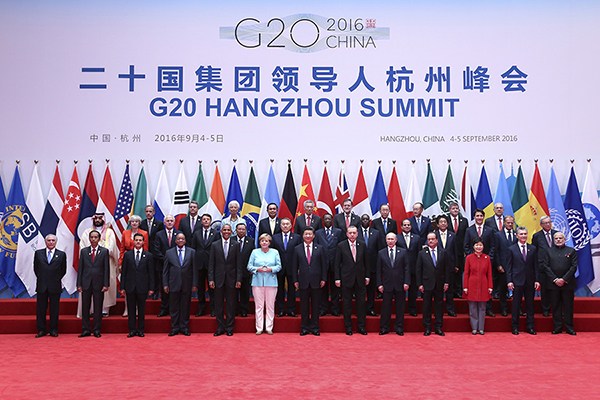
Chinese President Xi Jinping and other leaders of the Group of 20 (G20) members, some guest countries and international organizations pose for a group photo ahead of the opening ceremony of the G20 summit in Hangzhou, capital of East China's Zhejiang province, Sept 4, 2016.(Photo/Xinhua)
For some Western journalists covering the G20 Summit in Hangzhou, East China's Zhejiang province, early this week, the biggest story was the U.S. President Barack Obama's staircase episode at Hangzhou airport or about the few reporters who could not get close to Obama to get on-the-spot comments.[Special Coverage]
Although Obama told the news media not to "over-crank" the significance of the issue, for days, some mainstream U.S. media outlets have been speculating that the Chinese must have "plotted" the episode to humiliate Obama.
It reminded one of some major U.S. media outlets' reports in November 2009 saying Obama had not been treated well by the Chinese during his first visit there. White House officials strongly disagreed. Jeffrey Bader, then senior advisor for Asia in the White House National Security Council who had accompanied Obama on the trip, said the media outlets did not correctly characterize the visit.
Some Western media organizations' obsession with the staircase episode shows how they are easily distracted by minor events and thus fail to focus on the main issues.
In Hangzhou, some Western reporters spent far more time writing and dramatizing the staircase story than covering important global challenges such as a slowing world economy, climate change, poverty, trade protectionism and international governance, issues that world leaders had assembled to resolve and issues that journalists should have delved deep into if they were in Hangzhou to cover the G20 Summit, and not to act like paparazzi.
People watching U.S. TV this past year got just one piece of news-the 2016 U.S. presidential election. The news media seem to have decided that that is the only thing Americans need to know and care about at least until the election on Nov 8.
Forget Iraq, Afghanistan and Libya where U.S. invasions and involvement have created a mess that the whole world has to cope with. Forget the National Security Agency's recently leaked software that is used to take over firewalls, akin to weapons of mass destruction going loose in the black market.
When Mike Flynn, retired U.S. Army general, admitted last year the U.S. military had a role to play in the creation of the Islamic State group, few U.S. media outlets covered it seriously. Back in 2011, mainstream U.S. media outlets, controlled by a few major corporations, chose to deliberately overlook the Occupy Wall Street protesters. However, the grassroots movement has turned into a powerful force and fuelled Democratic presidential candidate Bernie Sanders' campaign. Before bowing out to Hillary Clinton in the Democratic race, Sanders had raised the hopes of millions of Americans.
A Pew Center survey in July found that 60 percent of Americans are already worn out by the 2016 election coverage. Worse, most Americans say issues get little coverage because the media's focus is on candidates' comments and personal lives.
Some American journalists I talked with sighed that journalism in the U.S. has lost objectivity. Many Americans feel the same, as various surveys show.
A Gallup poll in September last year showed Americans' trust in the media was at a historical low. Only four in 10 Americans say they have a "great deal" or "a fair amount" of trust in the mass media to report news fully, accurately and fairly. That ties with the historical lows on the issue in 2014 and 2012. Before 2004, a slight majority of Americans said they trusted the mass media, such as newspapers, TV and radio.
There is no doubt that American journalists today need to work hard to regain public trust. They could start by focusing on important issues, instead of speculating and sensationalizing something like the Hangzhou airport staircase episode.
By Chen Weihua
The author is deputy editor of China Daily U.S.A.


















































